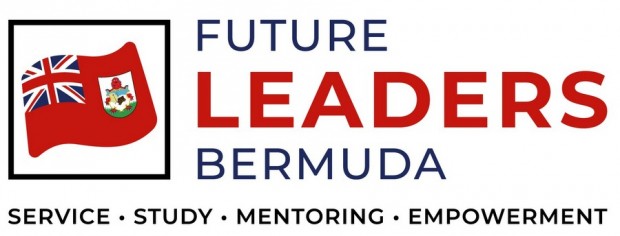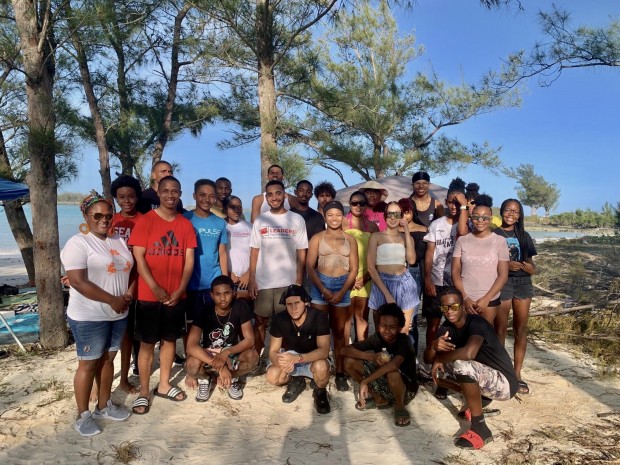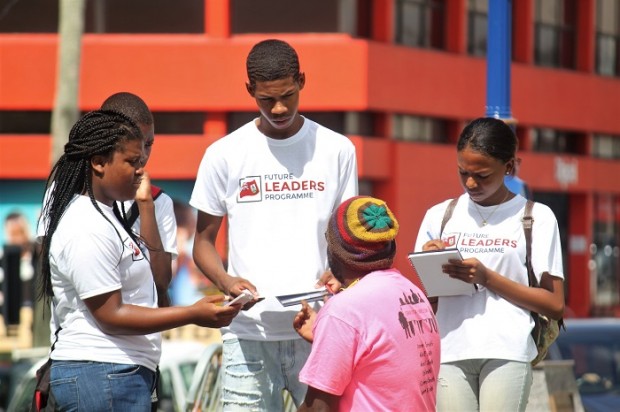Column: Five Years & Counting Of Future Leaders
[Written by Ryan Robinson Perinchief]
On this day five years ago, the Future Leaders Programme was founded on June 22, 2017.
Although I have spent some weeks reflecting on this milestone, rather than share that publicly at this time I would like to take a page out of the late Ms. Laverne Furbert’s book by offering a little history for the record on how it came to be, from ideation to launch.
The idea to create the programme developed in my head throughout my first year at Durham Law School, the 2016-17 school year.
I had been in the UK while many of my esteemed elders and loved ones, including my mother and other family members, were involved in the December 2nd pepper spray incident at the House of Assembly a few months earlier in 2016. I had published an opinion piece after watching the events unfold, but felt guilty for not being on island during that very tumultuous time. I knew I needed to do more to get young Bermudians involved in thinking about community issues. In addition, there had been numerous racial incidents at my university in northern England [which remained a common theme through all my 4 years there], and I was feeling very isolated. So, I have no doubt that the seed of the Future Leaders Programme was germinating in my subconscious around that time.
The pressure soon turned to diamonds and the idea took shape when I put pen to paper in January 2017. The draft business plan included a checklist of the basic things I would need to obtain for a summer camp to take hold. I came home from law school on easter break in March, and my first stop was to Dr. Phyllis Curtis-Tweed at The Berkeley Institute. She welcomed me into her office with no prior appointment and I asked if she would give her blessing for a room at the school to teach a summer leadership programme. She said yes instantly, and I was surprised at how easily it went. My booking request was sent to the facilities department that same day, and they accepted Dr. Curtis-Tweed and Mr. Craig Bridgewater’s endorsement on the condition that Berkeley students would participate free of charge.
This gave me the motivation to look for funding. Ariana Caines reviewed my sponsorship pitch, and Eron Hill was a trusted advisor on the overall strategy throughout. The first major sponsor for the programme was Premier Michael Dunkley. We met in his temporary office on Reid Street where I presented him the plan. He committed to making a personal contribution to fund four students, and matched it with Cabinet Office sponsorship. On the private sector side, I reached out to Conyers Dill & Pearman. The firm was happy to support, and David Astwood spoke at the launch event and press conference on the company’s behalf. The next donations came from individual members of the Progressive Labour Party after I was invited to make a presentation to Central Committee at Alaska Hall. The PLP was gearing up for the upcoming election as an opposition party that had seen war on all fronts since their 2012 loss at the polls. I was grateful for being given an audience at a time when resources and patience in the party were stretched very thin. At the end of the presentation, one of the members asked if I was a CIA agent in front of everyone; we would laugh about this two years later when he congratulated me for my speech on independence, where I guess I had since proven myself a bit more. Ultimately, the PLP members who donated were Tinee Furbert, Kim Lightbourne, Selena Fields, Russell Lister, and Mark and Tina Nash.
The final major sponsor was the Bermuda Industrial Union. It was important to me that the programme would be supported across the board – government, the union and the private sector. I met with President Chris Furbert, and we agreed the launch event and press conference would be held in the EF Gordon Hall. [This was the same hall where I would make my independence speech on the invitation of Ms. Laverne Furbert two years later]. In addition to sponsorship and hosting the launch event, the BIU invited the first cohort of Future Leaders to speak at their Annual Labour Day Banquet after President Furbert was impressed by what they had learned throughout the programme.
A number of family members contributed from the start and offered lots of moral support. Tracey Sharrieff was the first to make a personal donation, while my aunt Patrice provided snacks for the students. Troy and Georgina Dill donated from Midland Heights Church. My father transported the students to various field trips on his minibus, and my mother completed many errands. My cousin Katura helped me with the programme’s name, I was originally going to call it the Bermuda Civic Education Project.
Developing the curriculum was the most protracted part; I did this in my spare time to take my mind off exams. The first word I wrote in my notes was ‘integrity’. The lesson plans were inspired by the Center for Talented Youth, from which I benefitted greatly during my high school summers. I “Bermudianized” the themes into 6 key areas: 1] Service and Community, 2] Poverty, Violence, and Inequality, 3] Identity and Privilege, 4] Leadership, 5] Social Justice & Entrepreneurship and 6] How to become Agents of Change. They have since been refined to add a 7th unit on Taking Action, and incorporate additional concepts of Self-Determination, Logical Fallacies, and Environmental Justice. I also met with Dr. Llewelyn Simmons at the Ministry of Education, who endorsed the programme in the schools.
The hardest part of all was finding a teacher, which I actively pursued alongside all other stages of planning. The programme had no prior history, and it was hard to find someone to take a risk in dedicating three weeks of their summer to what at that point was simply an idea. I was able to convince Alandra Swan, my first debate coach, to deliver the programme alongside me. I first met her through her mother, Arleen Swan, my counsellor from Berkeley. Alandra’s background as a primary teacher at Francis Patton brought the energy needed to make the first programme a success. She did not return to teach in subsequent years, but she did induce me to write down a defined vision and purpose for the programme’s future. I will forever be grateful to miss Alandra for getting things off the ground and setting the standard for future growth. There was a point when the whole programme almost did not go ahead, because it had everything except a teacher.
Ms. Tonisha Key-Holmes has since gracefully filled that role, standing by my side to hold me accountable in the classroom for four years and counting.
The last thing I should speak about are the students themselves. The very first programme had 17 Future Leaders, an odd number because it was under-subscribed. [Those parents took a chance on me too.] It could only be divine intervention that blessed us with the most attentive, engaged, and enthusiastic group of learners for the first cohort. The programme went off without a hitch and set a high bar for everything we’ve done since. It was absolutely perfect. Logistically speaking, no year has gone so smoothly since the first, and that group of 17 now refer to themselves as “the OG [original] future leaders”.
During the second week of the programme, I thought it would be appropriate to have some form of closing ceremony to celebrate the students’ achievements. I planned this while student learning progressed simultaneously, with help from my mother, the Midland Heights Church crew, and the families of students who had been raving to their parents about their daily experiences. In lieu of a test to evaluate the students, I challenged them to condense all they had learned in the three weeks into a 1-hour presentation at the ceremony. They memorised everything to heart and wowed the audience. A general election had taken place 3 days before on July 18th, 2017, and a newly appointed Premier David Burt applauded the students at the closing ceremony.
At the time, I was twenty years old.
Overall, while I have many thoughts on what I’ve learned over the last few years and the future of the programme and Bermuda, to commemorate today’s milestone I wanted simply to recount the history and all who made it possible. I hope this might also be useful for others who are thinking of starting similar initiatives, should they wish to use this as a guide.
Throughout the past five years, the programme has grown tremendously, now a charitable organisation delivering empowerment activities all year round. This would not be possible without the continued support from the Government of Bermuda, in which Cabinet Secretary Major Marc Telemaque has been a pivotal resource. I am supported by a team of seven – two of whom, Mckenzie-Kohl Tuckett and Seon Tatem, are Future Leaders from past cohorts – in addition to all those named above and many more. I would like to take this time to thank all of them, including the various community partners who have engaged with our students over the years. Some organisations that have partnered with us each year since inception include The Salvation Army, Aries Sports Centre, CURB, the US Consulate and Mr. Juan Wolffe of Bermuda Court Services. An attempt to name all who have helped along this journey would certainly fail, so I would simply like to say thank you to all who believed in the vision for turning “me” into “we”. Together, we created something beautiful which I have no doubt will continue to develop for many more years.
The objective has always been, and will continue to be, to empower the next generation to “dare to invent the future”. In 2020 we published our first strategic plan to define a more holistic approach to doing that, and have since been further boosted by HSCM Bermuda as our first corporate platinum sponsor. The 5th cohort of Future Leaders will be announced in less than two weeks, and we are looking forward to yet another successful summer, and to continued mentorship and empowerment with the community’s support.
Future Leaders Bermuda is a community organisation and registered charity #1009 which offers students a range of meaningful opportunities to develop the knowledge, experience and leadership skills they need to make a positive change in the community.
For more information, visit www.futureleaders.bm.




